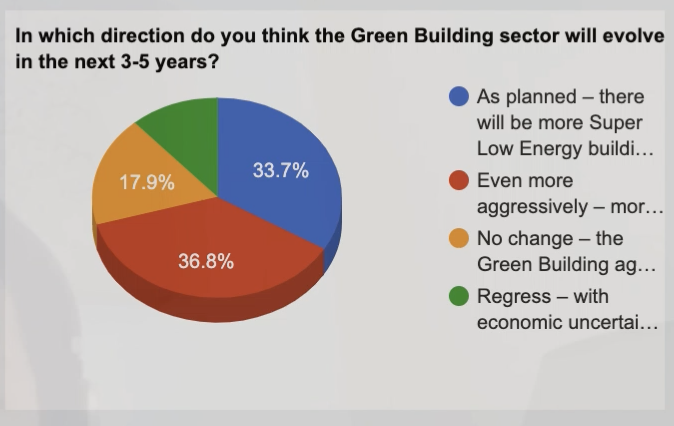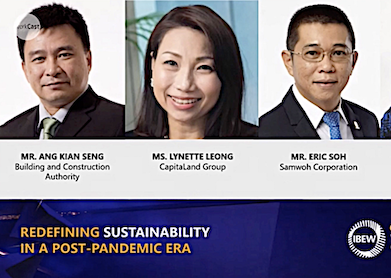2020
IBEW 2020: Redefining sustainability in a post-pandemic era
September 9, 2020
8 September 2020 — In this session, which is part of the International Built Environment Week (IBEW) 2020, speakers from leading organisations such as Building and Construction Authority (BCA), CapitaLand Group and Samwoh Corporation shared their sustainability journeys and how their efforts have accorded them a competitive advantage. This session will also look at how sustainability strategies need to be repositioned for success in the post-pandemic era.
“This pandemic has shown that the sustainability that allows everyone to thrive can only be achieved by design, not by disaster.”
Joelle Chen, the moderator for this session, started the session.
A poll conducted with the sessions’ attendees gave the following results:
In which direction do you think the Green building sector will evolve in the next three to five years?
- 33.7 per cent: As planned, there will be more Super Low Energy buildings
- 36.8 per cent: Even more aggressively – more net zero carbon buildings and thinking about embodied carbon
- 17.9 per cent: No change – the Green Building agenda has taken a backseat during the pandemic
- 11.6 per cent: Regress – with economic uncertainty there is less appetite for investment in Green buildings and sustainability

Ang Kian Seng, Group Director, Environment Sustainability Group, Building and Construction Authority (BCA)
Ang Kian Seng is also the current second vice president of the Singapore Green Building Council (SGBC). His portfolio includes the BCA Green Mark Scheme that certifies buildings on their level of environmental friendliness and energy efficiency. He plays an instrumental role in the formulation and implementation of Singapore Green Buildings Masterplans.

Co-creation of Singapore Green Building Masterplan (SGBMP)
In 2005, Singapore launched the BCA Green Mark Scheme. Since the beginning of 2020, the Singapore Green Building Council (SGBC) and BCA has been co-creating the SGBMP with the general public, industry and youth to build a shared vision for Green buildings in Singapore. The efforts thus far are aligned to combat climate change, where one of the key targets is to Green 80 per cent of Singapore’s gross floor area by 2030. The conversion moving forward is hence to make our buildings not just Green, but also Greener than before.
Green Mark buildings are targeting and achieving higher energy efficiency standards, with the industry capable to push the boundaries for more. The industry is targeting and achieving higher energy efficiency standards across various building typologies over the last five years. Green Mark buildings reap net positive savings throughout its life cycle, with energy savings outweighing the upfront investment costs in the long run. There is a strong business case for developers to strive for higher standards and go beyond the Green Mark Platinum rating. The number of Green Mark Platinum projects a year has doubled, compared to five years ago.
The SGBMP focus areas are as below, to push the boundaries for building performance, capture opportunities in the sector, and deepen conversations for collective action with SGBMP.
- Reducing energy demand through higher standards in buildings
- Capturing opportunities in the built environment sector
- Deepening conversations for collective action
Advancing net-zero in the tropics with the Super Low Energy Buildings (SLEB) Programme
Currently, there has been encouraging progress from SLEB Challenge with 14 SLEB projects in 2018, increasing to 55 projects in 2020 involving 79 industry stakeholders, such as developers/buildings owners, architects, ESD consultants, mechanical and electrical (M&E) consultants. Some examples include the Surbana Jurong Campus (Super Low Energy Building) with an estimated EUI of 82 kWh/m2/year, and the National University of Singapore, School of Design & Environment (NUS SDE) 4 (net-zero energy building) with an estimated EUI of 52.5 kWh/m2/year.

With net positive savings over the life cycle, widespread adoption of SLEB in Singapore will help reduce energy use and emissions in the buildings sector. The energy savings enjoyed during the building life cycle supports the case to raise minimum legislative energy efficiency standard. With the public sector leading the way, demand can be created for SLEB while building capabilities for a robust ecosystem that supports Singapore’s climate change commitments.
Post-pandemic sustainable and resilient design
Guidance notes on buildings air-conditioning and mechanical ventilation (ACMV) operations amid COVID-19 situation:
- Increase ventilation for indoor air dilution: Increase outdoor air intake; reduce indoor air recirculation; use window openings, etc.
- Enhance indoor air cleaning: Use high-efficiency filters for AHUs; localised air cleaning with portable air cleaners; use of ultraviolet Germicidal Irradiation (UVGI)
Viable options in the tropics that can enhance sustainability and resilience of buildings in a post-pandemic era: natural ventilation (NV) or mixed mode ventilation (MMV) to provide a comfortable microclimate for occupants.
Lynette Leong, Chief Sustainability Officer, CapitaLand Group
Lynette Leong is responsible for elevating the Group’s sustainability strategy and policies, and integrating it into its business and operations to drive strategic environmental, social and governance (ESG) efforts and deliver long-term economic value to stakeholders.

CapitaLand places sustainability at the core of what they do, seeking to grow in a responsible manner, deliver long-term economic values, and contribute to the environmental and social well-being of communities. The firm has been awarded the Green Mark Platinum Champion in 2020 by BCA.
The JCube shopping mall by CapitaLand has been awarded a Green Mark Platinum, with grey water recycling for the ice skating rink. Waste heat from the ice rink chiller is recycled to heat the water at the rink’s shower rooms and the ice resurfacing machines. Other Green Mark Platinum buildings under CapitaLand include Rochester Commons (a business park and executive learning centre with a sky garden), Bugis+ (retail mall with extensive greenery and green spaces throughout the development), Logistech (logistic building with large-scale installation of rooftop solar panels) and the Data Centre at 9 Tai Seng Drive (with efficient water-cooled systems).

CapitaLand’s 10-year sustainability master plan include the following factors:
- A holistic approach (environmental, social, governance and sustainability leadership)
- Innovation and collaboration
- Sustainable finance (Green loans)
- Value
Eric Soh, Chief Executive Officer, Samwoh Corporation Pte Ltd
With more than 25 years of diverse and in-depth experience in the built environment sector, Eric Soh is instrumental in charting the growth of the Group with an emphasis on innovation, sustainability, productivity and safety. He will be taking his Green endeavour to the next level with the construction of the first positive energy industrial building in Singapore: the Samwoh Smart Hub. He aims to use this demonstration building to spur the onus towards greater sustainability among the built environment community, to create a learning ecosystem to nurture the next generation, and to push the boundaries of innovations beyond the shores of Singapore

Samwoh Smart Hub is the first positive energy building (industrial) in Singapore with the BCA Green Mark Platinum Award. The building produces 15 per cent more energy than consumption; have energy-efficient resources; 1,300 tonnes of carbon abated or equivalent to 300 cars off the roads per year; and offers living laboratories for Green materials and sustainable technologies.
The firm’s long-term goals are:
- Building a more resilient and responsive business model
- Value add to all relevant stakeholders in the BE sector
- Strengthen the ESG practices
Joelle Chen, Programme Director, Beca Singapore, moderator for this session. At Beca Singapore, she leads the innovation and partnerships as well as create new digital ventures for the Singapore business. She specialises in executive stakeholder engagement, ecosystem development and strategic communication for change. Prior to Beca, she was the first Asia Pacific Head for World Green Building Council, spearheading the adoption of global initiatives promoting net-zero carbon and healthier buildings in the region. She also previously headed up the Smart Sustainable Cities team at the Economic Development Board, driving public-private partnerships through “Living Labs”.
To read the complete article, get your hardcopy at our online shop/newsstands/major bookstores; subscribe to FuturArc or download the FuturArc App to read the issues!
Previously Published Happening
Contact us at https://www.futurarc.com/contact-us for older articles.

